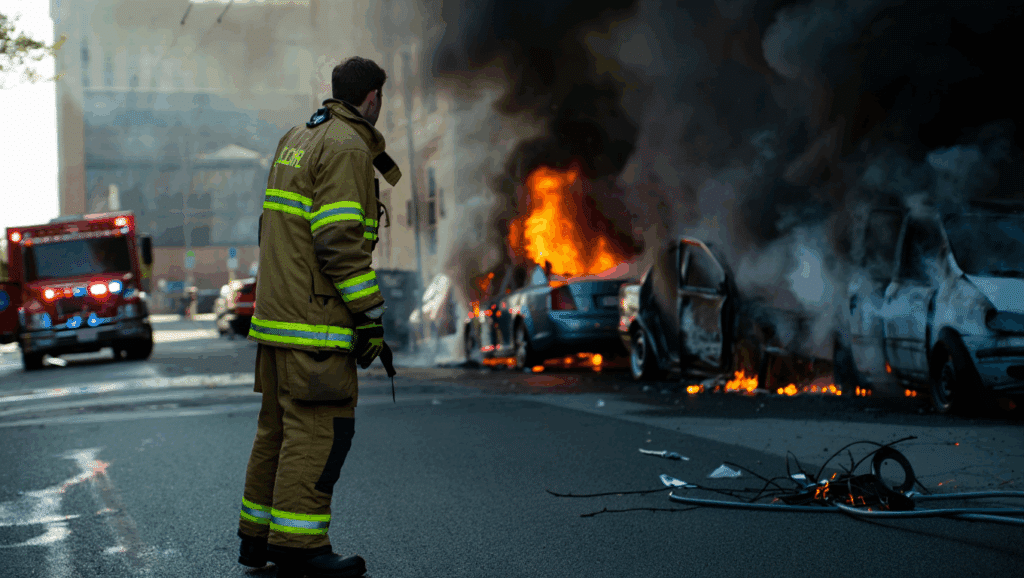First responders see things most people never will. They carry trauma from every call, every life they couldn’t save, every crisis they’ve witnessed.
Yet traditional therapy often falls short of addressing their unique experiences and the culture they work within.
There are specialized therapy approaches designed specifically for firefighters, EMTs, police officers, and paramedics. These methods understand their world and what they need to heal.
This blog will show you the most effective therapy options available, different types that work best, how to build support networks, and where to find the right resources. Help is out there, and recovery is possible.
Why Prioritizing Therapy Is a Lifeline, Not a Luxury?
Getting therapy early makes first responders stronger, not weaker. It builds skills to handle stress before it becomes overwhelming.
This means longer, healthier careers instead of early burnout. The ripple effects reach everywhere.
When first responders struggle mentally, their families feel it. Relationships suffer. Kids notice when mom or dad comes home different after tough shifts.
Teams work better when everyone is mentally healthy. Trust builds when people can rely on each other. This directly affects public safety ,clear-thinking responders make better decisions in crisis situations.
The stigma is real, but changing. Many departments now recognize that mental health support isn’t a weakness. It’s smart prevention. Getting help early costs less than dealing with a crisis later.
Therapy for first responders isn’t about fixing broken people. It’s about keeping strong people strong.
The Mental Health Reality for First Responders

First responders face mental health challenges that most people never encounter. Their job puts them in situations that test human limits every single day.
The Weight They Carry Daily
The mental health challenges first responders face go far beyond typical workplace stress. Here are the most common struggles they deal with every day.
- PTSD hits first responders hard: They see traumatic events repeatedly. Car crashes, fires, violence, and death become part of their routine. But the brain wasn’t designed to process this much trauma.
- Symptoms develop over time: Many experience flashbacks, nightmares, and severe anxiety. Sleep becomes difficult. They stay alert even when they’re safe at home.
- Burnout creeps in slowly: The constant pressure to save lives takes its toll. First responders often feel emotionally drained and physically exhausted. They start to feel disconnected from their work and the people they serve.
- Depression affects about 1 in 4 first responders: The statistics are sobering. They’re more likely to experience depression than the general population. Some days, getting out of bed feels impossible.
- Substance use becomes a coping method: Alcohol or drugs might seem like the only way to quiet their minds after tough shifts. Many turn to these substances to sleep or forget what they’ve seen.
- Compassion fatigue makes caring harder: After years of helping others in crisis, some first responders lose their emotional connection. They feel numb or detached from people’s suffering.
Why Their Stress Is Different
First responder stress isn’t like regular workplace stress. Their trauma exposure happens repeatedly, and the circumstances are unlike anything most people experience.
- They can’t control when trauma happens: A 911 call comes in, and they respond. There’s no time to prepare mentally for what they’ll find.
- The stakes are always life or death: Making the wrong decision means someone might die. This pressure exists in every call they take.
- They see humanity at its worst: Violence, accidents, and tragedies become their daily reality. Most people only see these things on the news, if at all.
- The culture expects them to be strong: Showing emotion or admitting struggle can seem like weakness in their work environment. This makes getting help feel risky.
- Their trauma is cumulative: Each incident adds to the last one. Over time, the weight becomes too much to carry alone.
Types of Therapy Tailored for First Responders

First responders face unique psychological challenges that require specialized therapeutic approaches. Here are the main types of therapy designed for their specific needs:
Trauma-Focused Therapy
This addresses PTSD and acute stress from witnessing traumatic events.
Techniques include Eye Movement Desensitization and Reprocessing (EMDR) and Cognitive Processing Therapy, which help process disturbing memories and reduce their emotional impact.
Cognitive Behavioral Therapy (CBT)
CBT helps first responders identify and change negative thought patterns that develop from high-stress situations.
It’s effective for managing anxiety, depression, and stress-related disorders common in emergency response work.
Critical Incident Stress Management (CISM)
This immediate intervention helps teams process traumatic events shortly after they occur. It includes debriefing sessions and peer support to prevent long-term psychological damage.
Group Therapy
Specialized group sessions with other first responders create a safe space to share experiences. Participants understand each other’s challenges, reducing isolation and stigma around seeking help.
Family Therapy
This addresses how job stress affects relationships and family dynamics. It helps partners and children understand the unique pressures first responders face and develops coping strategies for the entire family.
Mindfulness-Based Stress Reduction
These programs teach meditation and stress management techniques specifically adapted for high-pressure environments, helping responders stay centered during and after difficult calls.
Specialized Support Systems and Top Resources for First Responders
These resources recognize that therapy for first responders must be immediately accessible, regardless of time or location.
| Resource Type | Organization/Service | What They Provide | Access |
|---|---|---|---|
| Crisis Hotlines | Safe Call Now | 24/7 confidential crisis line for public safety | 1-800-267-5732 |
| First Responder Trauma Counselors | 24/7 emergency mental health support | Call or text available | |
| National Suicide Prevention Lifeline | Crisis intervention and suicide prevention | 988 | |
| Peer Support Programs | Critical Incident Stress Management (CISM) | Peer-led debriefing after traumatic incidents | Through local departments |
| Firefighter Behavioral Health Alliance | Peer support and crisis intervention | Online and phone support | |
| Employer Programs | Employee Assistance Programs (EAP) | Free short-term counseling through work | Contact HR department |
| Union Mental Health Benefits | Therapy coverage and specialized programs | Through union membership | |
| Specialized Therapy | First Responder Support Network | Trauma therapy specifically for public safety | National network of providers |
| ResponderStrong | Mental health training and therapy services | Online platform and local providers | |
| Anonymous Support | Fire/EMS Helpline | Anonymous peer support for fire and EMS | 1-888-731-3473 |
| Police1 Academy Mental Health | Training and anonymous support resources | Online platform | |
| Funding Resources | First Responder Trauma Recovery | Financial assistance for therapy | Grant applications available |
| Wounded Blue | Support for injured officers and families | Financial and emotional support |
The information provided in this table is for general informational purposes only and is not a substitute for professional medical or mental health advice, diagnosis, or treatment. While we strive to keep the contact details and resources accurate and up-to-date, availability and services may vary by location and over time.
How to Choose the Right Therapy Program
Finding the right fit matters when it comes to therapy for first responders. Not every mental health professional understands the unique pressures of public safety work.
The right therapist can make the difference between effective treatment and wasted time.
Finding the Right Therapist
- Look for therapists who specialize in trauma and first responder care. Ask about their experience with police officers, firefighters, EMTs, or paramedics.
- Some therapists have specific training in public safety mental health. Check their credentials and licensing.
- Verify they’re licensed in your state and have trauma-focused training like EMDR or CBT certification.
Practical Considerations
- Insurance coverage varies widely. Contact your insurance company to understand mental health benefits. Many EAP programs offer free sessions before insurance kicks in.
- Confidentiality protects careers. Therapists must keep sessions private unless there’s immediate danger. Ask about their confidentiality policies upfront.
- Cost shouldn’t be a barrier. Many organizations offer sliding scale fees or grants for first responders.
Conclusion
Taking care of mental health isn’t optional for first responders; it’s essential for survival and service. The specialized therapy options and resources outlined here can make the difference between thriving and just surviving in this demanding career.
First responders who get help early stay stronger longer. They protect their families, support their teams more effectively, and serve their communities better.
Share this information with fellow first responders. Send it to your station, squad, or department.
Mental health support works best when everyone knows what’s available.


















